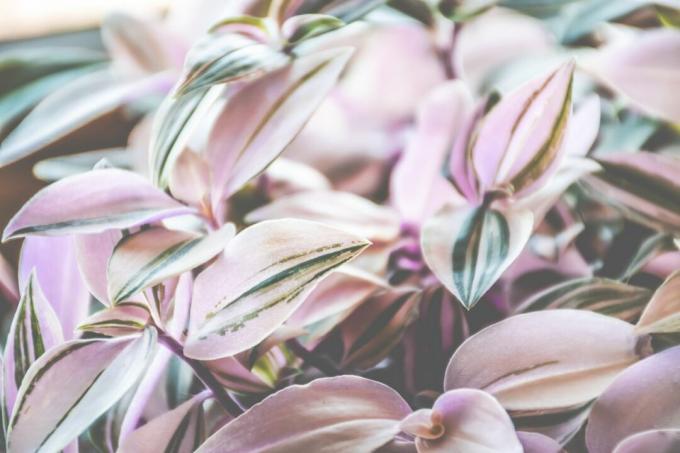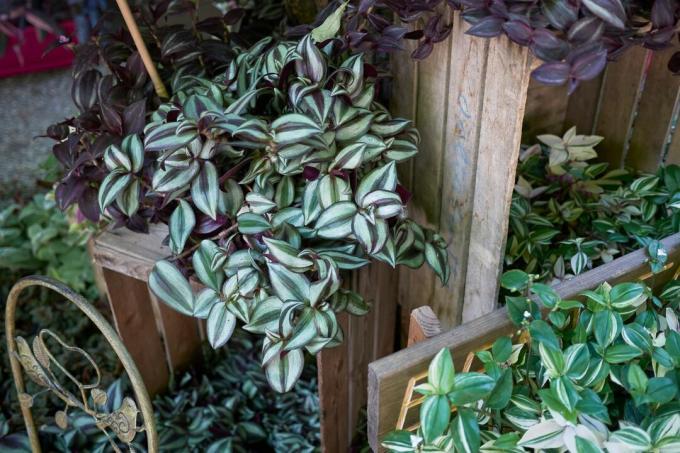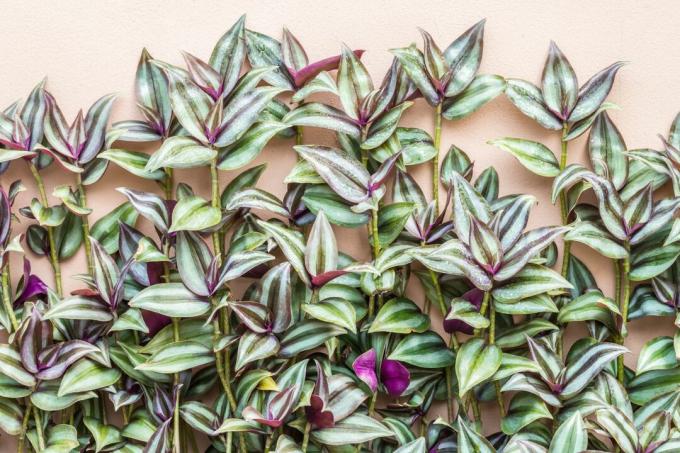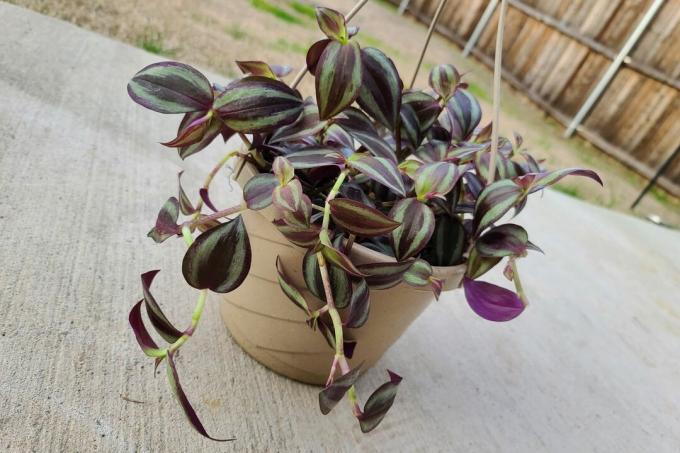The zebra herb stands out from many other green houseplants thanks to its colorful foliage. Here you will find the most important information about the location and care of the zebra herb.

The long shoots of the zebra herb come best (Tradescantia zebrina) hanging in a traffic light pot. In this article you will learn, among other things, how you can help the popular houseplant to grow bushy and what you should consider when caring for it.
contents
- Zebra herb: flowering, origin and properties
- The most beautiful varieties
- Planting Tradescantia zebrina: location, timing and procedure
-
Care of the zebra herb
- Cut, water and fertilize zebra herb
- Repot
- Propagate zebra herb
- Wintering: is zebra herb hardy?
- Is zebra herb poisonous?
Zebra herb: flowering, origin and properties
The zebra herb, native to South and Central America, belongs to the Commelina family (Commelinaceae). There is disagreement about the genus: In some cases the zebra ampelkraut belongs to the genus
Three-masted flowers (Tradescantiae) counted, sometimes it is counted as Zebrina pendula but also as a separate genus. The name zebra ampelkraut refers to the popular way of keeping houseplant in a hanging pot. This allows the long shoots to hang down over the edge of the pot and the green, silver and purple striped leaves to come into their own. In nature, in addition to the decorative leaves, pink flowers develop individually in the leaf axils throughout the year. Flower formation is also possible in indoor culture if the zebra plant receives enough light. As a weakly succulent plant, the zebra herb is able to store a little water in the leaves and shoots.
The most beautiful varieties
In addition to the classic zebra herb, there are also some varieties of Tradescantia zebrinawhich differ mainly in their color. We briefly introduce the most beautiful zebra herb varieties:
- Tradescantia zebrina "Quadricolor" has pink rather than purple leaves which, together with the green and white stripes, make a pretty pattern.
- Tradescantia zebrina ‘Purpusii’ has leaves in a particularly strong purple, which stand out next to the other, mostly green house plants.
- Tradescantia zebrina 'Discolor' Also scores with different colored striped leaves in pink, green and silver.

Planting Tradescantia zebrina: location, timing and procedure
The zebra herb is quite straightforward both in terms of location and maintenance. It is best to place the zebra plant in a bright place that is protected from the midday sun. However, a little sun in the evening or in the morning is good for the zebra plant. The temperature should correspond to normal room temperature during the growth period - between 20 and 25 ° C. During this time can Tradescantia zebrina can also be kept outside on the balcony or in the garden. A protected, not full sun location must also be ensured there. In winter it can be a bit cooler for the zebra plant, 12-15 ° C is sufficient here.
tip: If the zebra herb gets enough light, with a little luck you can also marvel at the pretty flowers.
The zebra herb does not need a special substrate, a versatile universal potting soil is absolutely sufficient. A particularly sustainable choice, for example, is ours Plantura organic universal soil dar: The contained clay minerals ensure that the soil has good water storage capacity so that the plant is supplied with water over the long term. In addition, the slightly acidic pH value is ideal for the zebra herb.

If you use cuttings to plant the zebra herb, you can place several cuttings in one pot. Depending on the size of the container, 10 to 15 cuttings fit next to each other, so that the zebra herb appears bushier.
Tip: A traffic light pot is ideal for hanging the zebra herb in the limelight. The best way to position the pot is in a bright place, for example in front of a west or east window.
Care of the zebra herb
It doesn't take much for zebra herb care to be successful. Like almost all tropical plants, it only needs water every now and then and the occasional application of fertilizer. A regular cut can also influence the growth habit.

Cut, water and fertilize zebra herb
Water the zebra herb regularly and always keep the root ball moist. The substrate may dry on the surface in between, but then water should be given again. Lime-free water is best. Young plants need a little more water, the soil should then always be evenly moist. Avoid waterlogging by draining excess water from the planter a few minutes after adding water.
In the growth phase, the zebra ampelkraut needs a fertilizer every now and then so that the nutrient supply is guaranteed. A classic green plant fertilizer, such as ours, is suitable for this Plantura organic indoor & green plant fertilizer. This ensures lush foliage and strong growth, so that the zebrina can develop long shoots. Root growth is stimulated by the microorganisms in our organic fertilizer.
Since the shoots of the zebra ampelkraut usually grow quickly and long during the growing season, pruning may be appropriate. In addition, the leaves often dry up on the shoots and are thrown off. The shoots can then be cut back generously in spring. This measure promotes branching and the zebra herb grows bushier.
Tip: To get a little closer to the tropical conditions, you can spray the zebra plant with a water atomizer from time to time.

Repot
You can repot the zebra herb during the growing season, i.e. between spring and autumn. When the old pot is completely rooted, it is time for a larger one. Otherwise, repotting every two to three years is sufficient.
Propagate zebra herb
The easiest way to propagate the zebra herb is to use cuttings. In spring, a few shoots can simply be cut off from the mother plant. These should already have a few leaves. Then place the cuttings in a water glass in a bright place. After a few days, roots should have formed and the cuttings can be planted in a pot. Since older shoots lose their leaves and become bare, the use of zebra herb offshoots is not recommended. With the cuttings method, new young shoots with many leaves are always obtained and the bare shoots shortened.

Wintering: is zebra herb hardy?
In winter, the zebra plant can also tolerate cooler temperatures, which should not, however, drop below 10 ° C. Then place the plant in a light spot so that the leaves keep their bright color. If the zebra herb experiences frosty temperatures, the shoots and stems freeze to death.
Is zebra herb poisonous?
The zebra herb is not poisonous for humans or animals. So you can put the plant in any suitable place in the home.
There are many more Three-masted flowerswhose flowers can also be admired in our latitudes. With us you can find out everything about the beautiful plant species.



